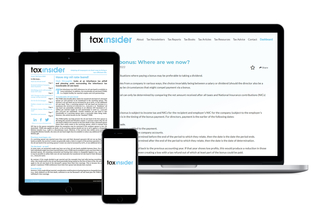 Ken Moody considers some employment-related securities issues where company owner-managers intend passing on their shares to the next generation as part of succession planning.
Ken Moody considers some employment-related securities issues where company owner-managers intend passing on their shares to the next generation as part of succession planning.
----------------------
This is a sample article from our tax saving newsletter - Try Tax Insider today.
---------------------
It is, of course, entirely natural that the shareholders of a family company should wish at some point for their children (who may already be involved in the business) to take over and allow the older generation to bow out. What could be simpler?
However, one is reminded at this point of the catchphrase from a Monty Python sketch, ‘Nobody expects the Spanish Inquisition’. Enter the employment-related securities (ERS) legislation!
Because it’s family?
If one or more of the children are employed in the business, then at first blush the shares they acquire will be regarded as acquired by reason of employment, albeit this does not follow as a matter of fact. This is because of an ‘Alice in Wonderland’ rule which deems shares to have been acquired by reason of employment, whether they are or not.
Fortunately, there is a very important exception to the deeming provision where the acquisition is through the ‘normal course of domestic, family or personal relationships’, which is the situation here. In that case, the shares do not ‘touch the sides’ of the ERS rules (at ITEPA 2003, Pt 7), which is ideal as Part 7 contains complex and sometimes very onerous provisions. Moreover, if the exception applies, by definition the acquisition is not reportable to HMRC, unlike an actual or deemed ERS acquisition.
However, suppose instead that the company issues new shares to the son or daughter of the parent shareholders. In that case, we do a 180-degree turn, because the exception from the deeming provision only applies if ‘the person by whom the right or opportunity [to acquire the shares] is made available is an individual’. The earlier HMRC guidance in its Employment Related Securities manual at ERSM20220 conceded that the exception might still apply where the shares are issued by the company, which was sensible, but the current guidance appears to adopt a stricter interpretation.
Twist in the tale
There is a further ‘twist’ to this scenario. It is important to appreciate that where an employee acquires shares in their employer for less than their market value, the discount is taxable, not as a ‘chargeable event’ under ERS rules, but simply as ‘earnings’ (within ITEPA 2003, s 62). However, this remains a factual test and an acquisition in the circumstances we are discussing would not normally attract the earnings charge.
Unfortunately, this gives rise to an anomaly due to the detailed rules for calculating the ‘chargeable proportion’ which is taxable when a ‘chargeable event’ arises in respect of ‘restricted securities’ (which most private company shares are regarded as – rightly or wrongly). Briefly, since no charge arose on acquisition, this leaves an ‘uncharged proportion’ of 100% which is taxable when a future chargeable event arises.
For example, if the son or daughter were to sell their shares, then as the legislation is drafted, the whole proceeds would be taxable as employment income. No doubt this was not foreseen when the law was drafted; but is it wise to ignore the point?
Practical tip
One possibility would be for the company to issue further shares to the parents for onward gift to the children (making a holdover election under TCGA 1992, s 165, assuming the company is a trading company).
If shares are issued directly to the children, it is essential that an election under ITEPA 2003, section 431 is made to pay any tax on acquisition on the market value of the shares ignoring restrictions, which takes the shares out of the restricted securities regime going forward. There is no downside as there is no charge on acquisition in the circumstances, but the election should, in my opinion, still be effective.



